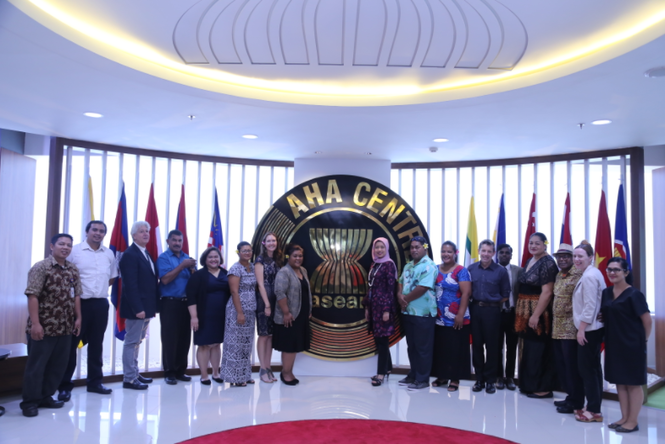
Despite differences in geography, population and economy, the Southeast Asia and Pacific regions have one key aspect in common: they both face unprecedented risks posed by natural disasters and climate change.
Over the past decade, both regions have suffered from the impacts of typhoons, hurricanes, flooding, earthquakes and droughts. Regional organizations are playing an increasingly visible role in humanitarian action and sustainable development. These institutions understand their regions well, and have shared cultures and, in some cases, shared languages. They are also directly impacted by – and thus have a greater incentive to address – transnational issues in their neighborhoods.
It was against this backdrop that a learning exchange on the “Development and Operationalisation of Regional Governance Frameworks on Disaster Risk Management and Climate Change Adaptation” between the Pacific Islands Forum (PIF) and the Association of Southeast Asian Nations (ASEAN), was facilitated by the International Federation of Red Cross and Red Crescent Societies (IFRC). The exchange took place at the end of August 2017, and was the first of its kind between these regions. It brought alive commitments made in the 2016 World Humanitarian Summit Agenda for Humanity, which sought to strengthen collaboration within and between regional organisations.
A delegation from the Pacific comprised of Governments and Red Cross National Societies as well as a representative from the Pacific Islands Private Sector Organisation (PIPSO) travelled to Jakarta for the two-day exchange. During these two days, the delegation met with representatives from the ASEAN Secretariat as well as the ASEAN Coordinating Centre for Humanitarian Assistance on Disaster Management (AHA Centre). The group from the Pacific represented the governance task force for Pacific Resilience Partnership, who will be advising and overseeing the operationalisation of the Framework for Resilient Development in the Pacific (FRDP).
While the Pacific is just starting its journey, ASEAN is soon to celebrate the 10-year anniversary of its legally binding ASEAN Agreement on Disaster Management and Emergency Response (AADMER). This agreement provides the framework and mechanisms for regional collaboration and coordination in disaster risk management. The Pacific representatives were keen to learn from their ASEAN colleagues about what has worked well and what they would do differently.
A takeaway for many in the Pacific delegation was that strong, clear policy frameworks have paved the way for ASEAN institutions and member states to work effectively for the benefit of people in times of disasters, setting aside any political or cultural differences.
The Vanuatu Red Cross Vice President, Mr Hannington Alatoa was impressed by how ASEAN has been able to coordinate its 10 member states to do “mega things in relation to DRR and CCA”. After visiting the AHA centre, the Director of Vanuatu’s National Disaster Management Office, Mr Shadrack Welegtabit was keen to explore how disaster management training opportunities in ASEAN can also be extended to the Pacific, and how response coordination models could be replicated by their National Disaster Management Offices.
The exchange highlighted that learning work both ways, and the colleagues from ASEAN also learnt a thing or two from their Pacific neighbours. The inclusive and multi-stakeholder governance model proposed under the Pacific framework is cutting edge, as is the way the Pacific is taking an integrated approach to disaster risk management and climate change adaptation.
ASEAN will be closely following how the regional mechanics unfold in the Pacific and what lessons they can learn from them. The outcomes of this initiative will form part of the recommendations from the Governance Taskforce of the Pacific Resilience Partnership to be considered by Pacific Island Leaders next month. It is anticipated that this exchange is just a first step towards a platform for continued dialogue and collaboration between ASEAN and the Pacific Islands Forum on how to make communities in Asia Pacific safer and more resilient in times of disasters. The Red Cross is delighted to a be a key partner in this journey.